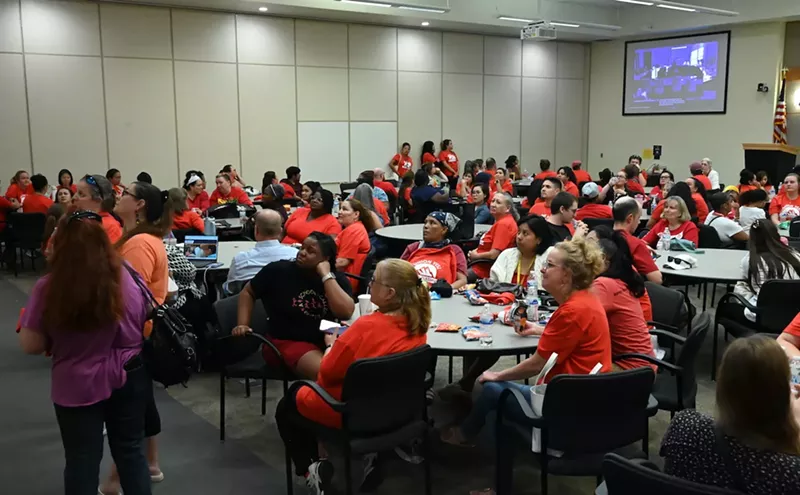But a quick peek at the big Web sites -- America Online, Yahoo and Alta Vista -- finds chat rooms devoted not just to sports, video games and gardening, but to daters, swingers and S&M aficionados. The possibility of meeting someone with similar interests is astounding. Stories abound of folks who've met pen pals, gone on blind dates, fallen in love, gotten married or ended up in the sack through the Internet.
As the trend has grown, so has health officials' interest in it.
Two years ago, four researchers from the Denver Department of Public Health were awarded a two-year, $74,200 grant from the Centers for Disease Control and Prevention to study sexual relations initiated over the Internet. The CDC had already set aside money for the study, and the Denver group was the only one to apply.
Dr. Mary McFarlane, a research psychologist and the CDC's Atlanta-based manager for the project, says she knows of no other groups that are researching the subject in depth. "We're ahead of the game quite a bit," she says. "This [research] is about as cutting-edge as you can get."
"We had been hearing anecdotal stuff from pop psychology and radio programs, and we felt it might be good to look into this phenomenon," she adds. "The Internet has made it more convenient for people to conduct business. Maybe it is also making it easier for people to meet sex partners."
Since October 1998, the researchers have observed 175 different sex-related chat rooms; they have recorded so many instances of people propositioning one another that Dr. Sheana Salyers Bull, a behavioral scientist who is leading the effort, feels a Web-savvy STD/HIV prevention program needs to be implemented -- and soon. "The buzz around the clinics is that more people are meeting through the Internet. Our focus is on documenting how people solicit sex partners over the Internet. We are looking for any kind of evidence that would suggest people are soliciting sex."
One of the sites that Bull's team looked at was www.adultfriendfinder.com. The site unabashedly promotes free and open sex, and is full of personal ads featuring nude photographs and graphic desires. One chat room is named "The Basement" for its sadomasochistic content. Others, like "The Cozy Bed," "The Wild Room" and "The Back Seat," are geared for cybersex at the least and real sex at the most.
One of the site's satisfied customers, Angel4fun, is quoted on the front page: "I have had overwhelming numbers of responses and have met three or four guys in person. I've had incredible sex with the men I've met."
While such adventures might sound intriguing, they can also be dangerous.
In July and August 1999, a syphilis outbreak in San Francisco was traced back to an online chat room. According to the San Francisco Department of Public Health, seven gay men infected with the disease went to free clinics, where it was discovered that they had met their sex partners through the same AOL chat room. Furthermore, it was found that among them, the seven had had sex with a total of 99 people -- one man having had 47 partners -- in the three months prior to their treatment for syphilis. Five were also HIV-positive.
This news alarmed Bull and her colleagues. "There is a very large-scale effort in the United States to eliminate syphilis," Bull says. "Progress has been made, both with syphilis and HIV, but we are wondering whether more cases of HIV and STDs are being contracted through the Internet, and we do not want this to set us back."
The second stage of the project is an online survey asking adults to be candid and frank about how they use the Internet to find sex partners. The survey -- at www.sexquiz.org -- records the mundane: age, sex (including transgendered), education, ethnicity, diet, income and state of residence. But it gets personal, too, asking what kind of chat rooms people have met sex partners in and where they met those people face-to-face. It also asks what kind of sexual activities people have participated in; whether they discuss HIV status with their new partners; if they use drugs or alcohol prior to sexual activity; and whether the person they met online had lied about him/herself.
To recruit people for the survey, Bull and her team sent out mass e-mails, posted messages on Internet bulletin boards, linked the quiz to six search engines and entered chat rooms to solicit volunteers. They need 1,700 people to make the survey valid; as of April 13, some 400 people had filled it out.
The results of the survey won't be published for another four to five months. Bull is hopeful that she'll be able to get an additional three years of funding from the CDC in order to develop the third stage of her program, which she describes as "an HIV and STD prevention program, something effective enough to reach these people and protect their privacy."
After the syphilis outbreak in San Francisco, the city's health department decided to do something as well. "This new venue requires us to make new means by which we communicate messages about safe sex," says Jeffrey Klausner, director of STD prevention and control services for the department.
"[We] talked to AOL, and they didn't feel it was possible to provide messages in chat rooms set up by private individuals," says Klausner. Instead, he says, AOL directed his department to marketing portals that target gay Web sites. The SFDPH bought ads on PlanetOut's Web page and has used its own Web site to "actively promote safe sex" through the Internet.
The Denver Free Clinic has reported only one STD case that was contracted through an Internet contact, and Bull says she isn't jumping to conclusions about the trend in the rest of the country. "We are suspicious that more people are having sex through the Internet, but we don't know yet," she says. "Right now, people don't have a [concrete] idea of whether [the Internet] is effective for obtaining sex partners."
One thing Bull knows for sure: Everybody's talking about it.












